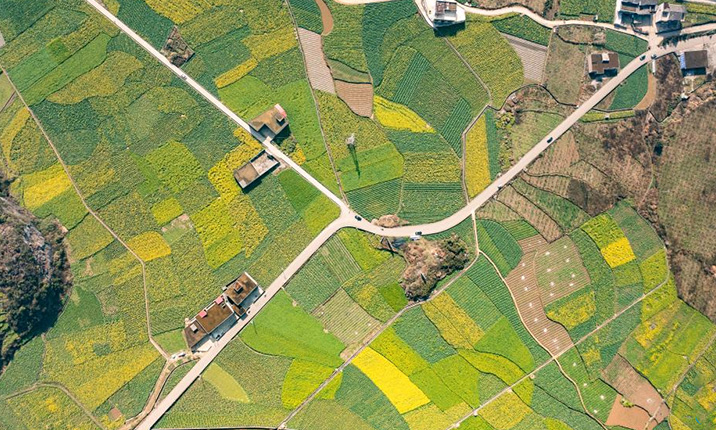Tanzania recommends adoption of Chinese Juncao technology to promote sustainable agriculture

Tanzanian Minister of Livestock and Fisheries Mashimba Ndaki (1st R) speaks at the opening session of a national workshop on "Applications of Juncao Technology and its Contribution to the Achievement of Sustainable Agriculture and the Sustainable Development Goals in Tanzania" in Dar es Salaam, Tanzania, on March 8, 2022. The government of Tanzania recommended the adoption of the Chinese Juncao technology to promote sustainable agriculture and the livestock industry in the east African nation. Juncao, which literally means "mushroom" and "grass," can be used, as its name suggests, to grow edible mushrooms, as livestock feed or as a green barrier to stop desertification. (Photo by Herman Emmanuel/Xinhua)
DAR ES SALAAM, March 9 (Xinhua) -- The government of Tanzania recommended the adoption of the Chinese Juncao technology to promote sustainable agriculture and the livestock industry in the east African nation.
Juncao, which literally means "mushroom" and "grass," can be used, as its name suggests, to grow edible mushrooms, as livestock feed or as a green barrier to stop desertification.
Mashimba Ndaki, the Minister for Livestock and Fisheries, said on Tuesday the government has launched the application of funds from the Chinese government for implementing the Juncao technology for livestock fodder and mushroom production.
Ndaki was speaking at the opening session of a national workshop on "Applications of Juncao Technology and its Contribution to the Achievement of Sustainable Agriculture and the Sustainable Development Goals in Tanzania". The Juncao technology has been developed by the National Engineering Research Center for Juncao Technology of the Fujian Agriculture and Forestry University (FAFU) of China.
The technology has a multi-faceted approach of cultivating mushroom and fungi for food and medicinal purposes while at the same time addressing soil erosion for maintaining the volume of arable land, and also supporting livestock feed development.
"The Juncao technology will increase mushroom production and consumption which will contribute to food security in the country thus achieving the 2030 Agenda for Sustainable Development in the country," Ndaki told the four-day workshop that has brought together national policy makers, academicians, researchers, farmers, livestock keepers and experts from FAFU and the UN.
He said Juncao technology will contribute to an increase in pasture availability and boost livestock productivity that will help in poverty reduction and raise the national income.
Lin Zhanxi, investor of Juncao technology, and chief scientist and director of the National Engineering Research Center for Juncao Technology of the Fujian Agriculture and Forestry University (FAFU) of China, said on a video conference that Juncao technology is helping in adapting and mitigating challenges posed by climate change.
Yuan Lin, Economic and Commercial Counselor in the Chinese Embassy to Tanzania, said during the past two decades, this handy and practical technology has taken root in more than 100 countries.
"It not only helps create hundreds of thousands of green jobs for local people, lift people out of poverty and realize gender equality by women economic empowerment, but also plays an important role in promoting the use of renewable energy and addressing climate change," he said.
Yuan said China stands ready to work with relevant parties to spread Juncao technology to more developing countries and make further contributions to the implementation of the UN 2030 Agenda for Sustainable Development with China's wisdom and solutions.
Amson Sibanda, chief of National Strategies and Capacity Building Branch in the Division for Sustainable Development Goals in the United Nations Department of Economic and Social Affairs (UN-DESA), said in the past year, notable progress has been made to promote Juncao technology in Tanzania.
"To allow farmers to obtain first-hand knowledge of Juncao, a Juncao learning manual has been prepared in Swahili," said Sibanda, adding that a series of farmer workshops were organized in Morogoro, Shinyanga and Kilimanjaro regions.
"We have also seen strong interest in the Juncao technology from the government, research institutions and other stakeholders," he added.
Sibanda said Juncao technology, which is being transferred to developing countries through south-south cooperation, allows farmers in developing countries to grow several types of mushrooms without cutting down trees and damaging the environment.
"Such an environmentally friendly technology can help small scale farmers and farming communities to develop a low-cost , commercial scale mushroom cultivation industry that can provide sustainable livelihood for thousands," said Sibanda.
In addition, he said, the technology can also be used for producing cattle feed, methane gas and minimize soil erosion to combat desertification.
John Machiwa, former dean at the College of Agricultural Sciences and Fisheries Technology at the University of Dar es Salaam, said there are 5,000 mushroom growers in Tanzania producing 1,000 tons of mushrooms annually.
Photos
Related Stories
- Feature: Chinese company protects wildlife while building hotels in Tanzania
- Former African diplomats recall joys at China's restoration of lawful seat at UN
- Tanzania's Zanzibar decorates Chinese medical team with special medals for outstanding work
- Researchers use Juncao to rehabilitate polluted soil in northern China
- China’s Juncao technology cooperation mirrors the country’s commitment to common progress
Copyright © 2022 People's Daily Online. All Rights Reserved.










